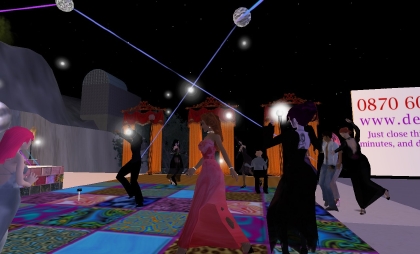 Something for you to read during the holiday season from Extropia DaSilva, who has probably written her best and most thought-provoking essay so far: one that even explains immortality and how we can achieve it! — Gwyn
Something for you to read during the holiday season from Extropia DaSilva, who has probably written her best and most thought-provoking essay so far: one that even explains immortality and how we can achieve it! — Gwyn
‘I’m gonna live forever!’ — Theme Tune to ‘Fame!’.
INTRODUCTION
People who make a living out of creating imaginary worlds- authors, playwrites and scriptwriters- can sometimes achieve an extraordinary thing. That thing, is the creation of a character whose longevity far outlasts that of its creator. Charles Dickens may be long dead, but the likes of Oliver Twist or Scrooge live on in countless reprints, stage productions and movie adaptations.
Of course, characters such as these are fictional and therefore not real. And yet, a popular character can sometimes feel more real than the person who invented it. Take Homer Simpson for example. I know what he looks like, and where he lives. I know the names of his wife and children, and what animals he keeps as pets (and what he calls them). I know what his interests are (drinking beer, television) and what he would rather not do (work). I know he screws his face up and yells ‘d’oh’ whenever a bad situation caused by his own stupidity arises.
But what about Mat Groenig? What could I tell you about the creator of the Simpsons? Apart from the fact that Mat Groenig created the Simpsons, nothing. To me, ‘Mat Groenig’ is nothing more than a signature found on Simpson’s merchandise.
I think that on-screen characters who stand the test of time come in two forms, which I shall call ‘Virals’ and ‘Definitives’. A ‘definitive’ is a character that is almost exclusively associated with one particular actor or actress. For instance, L Frank Baum’s series of books about the Wizard of Oz have spawned many stage plays, films and TV adaptations and many actresses have played ‘Dorothy’, including Stephanie Mills, Violet MacMillan and Diana Ross. But, if I were to ask a thousand people to picture Dorothy in their mind, I can be pretty sure each person would think of a young Judy Garland.
A ‘Viral’, on the other hand, is a character that has been played by many different actors/actresses, but no one performance is universally agreed to be the definitive one. A good example would be Ian Flemming’s James Bond. While most people who enjoy Bond films probably have a personal favourite, the big difference between them is this: If I asked a thousand people to visualise Bond, I cannot be nearly as certain with regards to what actor they are imagining. It sometimes seems to be the case that an actor becomes so closely associated with a role, that nobody else could be cast to play that part. Somehow, seeing any face other than Harrison Ford’s beneath Indiana Jones’ battered fedora would not ring true. Other characters, though, become independent of any one actor (although that obviously does not mean any person could convincingly portray the character).
Second Life also has its share of popular characters, such as Prokofy Neva or Anshe Chung. When I say ‘popular’, I do not necessarily mean they are universally adored, I mean those are names people may well have heard of. Also, I am not suggesting that their fame is comparable to an icon like ‘Donald Duck’ or ‘Indiana Jones’. In fact, I would be surprised if anybody uninterested in SL has ever heard of even the most famous resident of all (whoever that is). But, within the SL community some residents could justifiably be called famous. Just maybe, in the future one or more residents will indeed achieve recognition comparable to the likes of ‘Spiderman’, ‘Luke Skywalker’ or ‘Jane Eyre’. But, could an SL resident ever achieve the ultimate, and actually outlive its own creator?
When I say, ‘outlive’, I mean it in literal terms. I do not mean ‘leave behind a legacy’, although of course that could happen too. Perhaps Scope Cleaver’s fantastic architectural work will make his name as long-lasting as Christopher Wren’s. But, could Scope himself actually continue working and socialising in SL, even when the person who created him had long since died?
THE ICONIC SL REPORTER.
As far as I know, Mat Groenig is alive and well. But, if he were to die, the following obituary would make very little sense:
‘Homer Simpson died today. Simpson (who was Mat Groenig in real life)…’
The error, of course, was to mistake Groenig’s role in creating that character for being that character. This kind of thing happens all the time in SL. Sometimes, sadly, the RL creator of a resident dies and when they do, it is just taken as self-evident that the person people knew in SL has been lost forever.
For many people, SL’s ancestry is most strongly linked with technologies like the telegraph, telephone, and email. In other words, anything facilitating communication between two or more people. Since you do not invent a character when speaking on the phone, you should also ‘be yourself’ (as far as that is possible) in a virtual world like SL. If a resident adhering to such a mixed-reality principle were to achieve iconic status, almost certainly they would become a ‘definitive’ in a much deeper sense than the association between, say, Harrison Ford/Indiana Jones. I am sure most people appreciate that Ford is not Indiana Jones in RL, however hard it may be to imagine any other actor playing that part. But a resident like Hamlet Au, who makes no distinction between his SL self/occupation and his RL self/occupation (his RL name is Wagner James Au btw ), is very much one person. If Harrison Ford had died and a fifth Indiana Jones movie was commissioned, just maybe some other actor could prove me wrong and play that part as well or better than Ford did. How would residents feel, though, if Wagner James Au’s death was announced, and Hamlet Au turned up at at a funeral held inworld in remembrance of Wagner James Au? I do not mean some other resident wearing a copybot clone of his avvie, I mean ‘the’ Hamlet Au — or, at least, he claims to be ‘the’ Hamlet Au. I cannot imagine anyone accepting such a claim.
Some residents see SL’s ancestry as most strongly linked with novels, theatre and movies. Those are all technologies that can create ‘digital people’. By that, I mean they are technologies that can organise patterns of information in such a way as to make you or I believe in the existence of somebody or something that does not necessarily exist in real life. Those who choose to see SL in this light call their avatars ‘digital people’ and try (as far as it is possible) to make them distinct individuals in their own right. Not that it does much to change people’s assumptions, since everybody insists there is just as much a one-to-one correlation between a digital person and one specific RL person, as there is between a person who uses their avvie for ‘mixed-reality’ purposes.
But, I have often wondered if such a resident could be played by several different people over the years in RL, and yet always be accepted as the same unique individual in SL. A digital person would have one possible advantage over a ‘viral’ movie character, which is the fact that, regardless of who logs into that particular account, the appearance of the avatar need not change. Anybody can immediately see that Daniel Craig is not Pierce Brosnan (even if both can be equally accepted as ‘James Bond’), but if ‘James Bond’ had been a resident in SL, roleplayed by Brosnan who never revealed any information about his RL identity, how could we know if ‘Bond’ was subsequently played by Craig?





